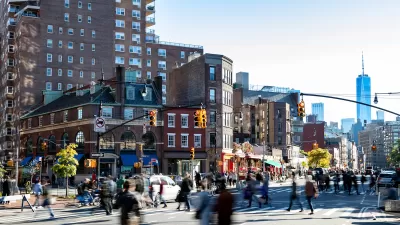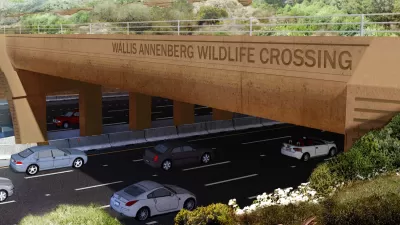In the first edition of a new series profiling urban planning, development, and design students from across the country, masters students from the University of Maryland, University of California, Irvine and University of Pennsylavania share intriguing insights into why they chose the planning field, how they hope to contribute, and what the future holds for the profession.
 Francis D. McLaughlin
Francis D. McLaughlin
Degree Objective: Economic Development Planning
Expected Graduation: May 2005
University of Maryland at College Park, School of Architecture, Planning, and Preservation
What compelled you to attend planning school?
I decided to attend planning school because I believed that the best way for me to affect positive change in the Two-Thirds ("developing") World was through a career as a planner. While serving as a U.S. Peace Corps volunteer in a Mayan village in the central highlands of Guatemala, I read "Bigger Not Better: How to Take Control of Urban Growth and Improve Your Community" by Eben Fodor. It inspired me. Upon returning to the U.S., I was filled with a sense of urgency to continue doing work that would benefit the people in the village where I lived and in other places throughout the developing world. Since then, I have become aware of such problems as the squatters on the hills of Rio, the displaced people in Central China, the dislocations caused by the coming and going of the maquilla industries on the U.S.-Mexico border, and other challenges. Planners have a unique opportunity to address complex issues in the poorest developing countries, e.g., delivering public services (water, sewer, electricity, shelter, and efficient transportation systems) and establishing community development projects to reduce environmental destruction and increase sustainability.
What do you hope to pursue after graduation?
After graduation, I hope to do field work for multilateral and nongovernmental organizations such as the United Nations, the International Committee of the Red Cross, Cooperative Housing Foundation International, and Catholic Relief Services.
What do you see as the future of planning?
I believe that the work of planners is expanding geographically to more parts of the Two-Thirds World and substantively to include new problems caused, e.g., by natural disaster, war, environmental destruction, and corruption. Planners will increasingly play an important role internationally in emergency preparedness, the provision of humanitarian assistance, sustainability, and social justice.
 Kelly Koldus
Kelly Koldus
Degree Objective: Urban and Regional Planning
Expected Graduation: June 2004
University of California, Irvine, Department of Planning, Policy and Design
What compelled you to attend planning school?
I grew up in Orange County, CA and pursued my undergraduate studies at UC Irvine, but I had the opportunity to intern in Washington, DC, and go on exchange to Australia. Somewhere between interning at the Smithsonian and swimming with crocodiles in Kakadu, I realized that I was interested in how tourism has affected cities and regions. Upon my return to the U.S., I realized that UC Irvine had a graduate program in urban and regional planning. On a whim, I applied and was accepted.
When I received my Bachelors of Arts in both Criminology, Law and Society and Environmental Analysis and Design in June of 2002, I decided to spend that summer at the Grand Canyon. I worked at one of the hotels for minimum wage and lived in employee housing for sixteen dollars a week. My experience at the South Rim made me question what ecotourism and sustainable travel really meant, and whether I could ethically travel if the impact of my visit left locals in poverty.
My graduate studies at UCI have led to me to pursue these questions about travel and tourism. While some planners focus on specific topics such as historic preservation or traffic modeling, I've decided to become the tourism "jack of all trades." My masters thesis is entitled "Affordable Housing in Mountain Resort Towns: Policy Recommendations for June Lake, Mono County, CA," although I am by no means a "housing person."
What do you hope to pursue after graduation?
Since I went straight into graduate school from undergraduate, I've decided to temporarily derail myself from the career track in order to travel. I plan to race sailboats in Newport Harbor and Martha's Vineyard this summer, and have applied for a transportation planning internship in the National Parks for the winter. I think I will eventually seek a position as a consultant in the private sector that will allow me to travel, and I will settle into a public position when and if I find a place that really captures my imagination.
What do you see as the future of planning?
The future of planning is all about infill. I think it's terrible that someone like me, who has spent her entire life in Orange County and has chosen a median-income profession, is more or less completely shut out of the housing market. Unless I want to move out to the Inland Empire and spend three hours a day commuting, I will overpay for housing. I think communities really need to make an investment in their own cohesiveness and adopt inclusionary or other housing policies that will ensure that our cities and suburbs do not lose their middle class. At the same time, I have a strong commitment to open space and preserving agricultural lands, but I do not see these as competing interests.
 Matthew J. Edmond
Matthew J. Edmond
Degree Objective: City Planning
Expected Graduation: May 2004
University of Pennsylvania School of Design
I was compelled to pursue a graduate degree in city planning because I held a deep concern about the deterioration of older urban places, the rapid transformation of rural open space into suburban communities, and the economic inequalities that result from how our nation values economic mobility. In other words, I had an overwhelming desire to learn--and maybe someday be able to influence--the factors that create the reality of the physical environment surrounding us.
These deep concerns weren't created overnight. They came about over the course of ten years and were shaped by plenty of personal memories and experiences living in two completely different urban environments. Having grown up in a working-class row home neighborhood in Philadelphia, and then moving during high school to a growing suburban community on the fringes of the region, I saw both sides of our national problems of urban decay and suburban sprawl.
By the time I began considering planning school, my experiences really bothered me. I worried about the future decline of the neighborhood (and the city) I grew up in, and I was also disgusted at the isolating design and development of the suburban subdivision that I called home after my family left the city. After learning that city planning was a profession that sought to deal with these issues head-on, I knew it was time for a career change. And because my passion is for Philadelphia, I chose to attend the University of Pennsylvania.
What do you hope to pursue after graduation?
After graduating this spring, I hope to pursue a career that allows me to have a hand in the physical and economic redevelopment of urban neighborhoods.
It's hard to know what form of employment this career goal will take. In the short term, I may end up working for a government agency or a quasi-governmental entity (such as a special services district). But in the long run, I can envision myself working for a developer who specializes or has a strong interest in urban redevelopment and infill housing. There's always the possibility of forming a company later in life that engages in such development--but only if I feel I have attained the experience necessary to make it work.
I would also consider practicing planning at a private planning or design firm. Strategic planning and land use planning still excite me, even though my planning education has made me see the profession as much broader. The truth is, I'm a realist. And because planning is so much more than making the ubiquitous "plan," I honestly expect to jump between sectors of the planning profession throughout my career.
What do you see as the future of planning?
I really believe that the future of planning is in the private-sector. As time goes by, more and more graduates of planning programs will increasingly find their way into real estate development, consulting, planning law, or similar fields. Planners will be more likely to find the loopholes in municipal regulation than to be the ones enforcing it.
It's no coincidence that the emergence of the professional planner and the planning bureaucracy occurred at the same time the federal government began making moral and financial commitments to urban renewal. Unless the federal government reverses three decades of policy and once again begins giving cities large sums of money to make concentrated, wholesale changes in the built environment, planners will increasingly lead an exodus from the public-sector.
Our nation's values and economy are constructed upon the free market, and planning students know this. They have lost faith in the bureaucratic institutions and planning processes championed by previous generations of planners. It is not some Housing Authority that is building McMansions in the middle of suburban greenfields, or a redevelopment authority leading the revitalization/gentrification of American downtowns. It is real estate developers and other private-sector (or not-for-profit) enterprises. Tomorrow's city planners are taking note.
The romanticized image of city planning--of Moses, of Bacon, of Tugwell--is passing away under ever-changing shifts in demographics, government policy, and societal values. There will always be a need for public-sector planning. But the hallmarks already emerging in Generation Y--disillusionment with formal institutions, rejection of claims to authority, a result-oriented mindset--will blaze new paths within city planning, away from traditional government planning and toward alternative opportunities in the private-sector.
Now, tell us why you got involved in planning...

Pennsylvania Mall Conversion Bill Passes House
If passed, the bill would promote the adaptive reuse of defunct commercial buildings.

Planning for Accessibility: Proximity is More Important than Mobility
Accessibility-based planning minimizes the distance that people must travel to reach desired services and activities. Measured this way, increased density can provide more total benefits than increased speeds.

World's Largest Wildlife Overpass In the Works in Los Angeles County
Caltrans will soon close half of the 101 Freeway in order to continue construction of the Wallis Annenberg Wildlife Crossing near Agoura Hills in Los Angeles County.

Eviction Looms for Low-Income Tenants as Rent Debt Rises
Nonprofit housing operators across the country face almost $10 billion in rent debt.

Brightline West Breaks Ground
The high-speed rail line will link Las Vegas and the Los Angeles area.

Colorado Bans No-Fault Evictions
In most cases, landlords must provide a just cause for evicting tenants.
City of Costa Mesa
Licking County
Barrett Planning Group LLC
HUD's Office of Policy Development and Research
Mpact Transit + Community
HUD's Office of Policy Development and Research
Tufts University, Department of Urban and Environmental Policy & Planning
City of Universal City TX
ULI Northwest Arkansas
Write for Planetizen
Urban Design for Planners 1: Software Tools
This six-course series explores essential urban design concepts using open source software and equips planners with the tools they need to participate fully in the urban design process.
Planning for Universal Design
Learn the tools for implementing Universal Design in planning regulations.























